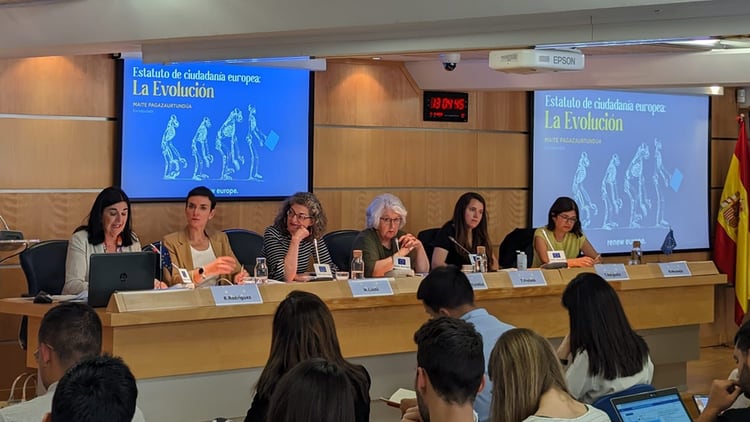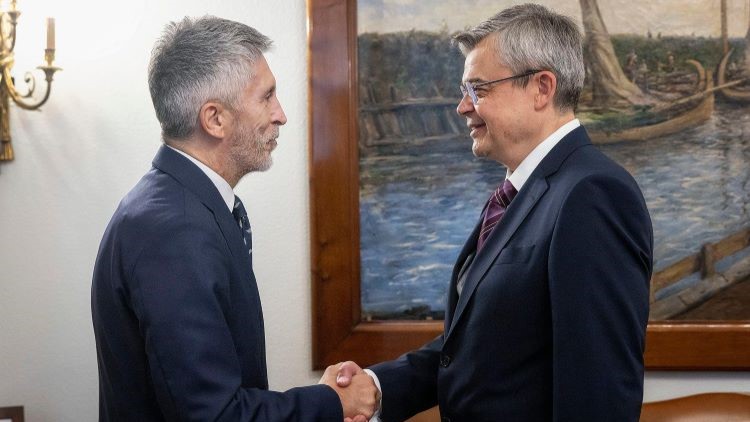Luis Ayllón
Maite Pagazaurtundúa, MEP for Ciudadanos, yesterday urged the Spanish Government to promote, during the six-month Presidency of the European Union, which begins on July 1, the adoption by the EU-27 of a European Citizenship Statute.
Pagazaurtundúa, who is also vice-president of the European Parliament’s Freedoms Committee, presented her proposal, supported by the Renew Europe group, for the creation of a Statute that favors the application of the rights of EU citizens and that, in addition, adds others that allow the creation of a “democratic and European identity”, such as those related to the digital world.
The event took place at the headquarters of the Delegation of the European Parliament in Madrid, and was also attended by the Secretary General for the European Union of the Ministry of Foreign Affairs, María Lledó, who is directly responsible for the preparation of the six-month Spanish Presidency of the EU, and who agreed that “European citizenship is one of the most important achievements” reached in recent decades and assured that “it reinforces belonging to the Union and is materialized in very specific rights”.
Despite the good consideration of the idea among those responsible for European affairs, Maite Pagazaurtundua acknowledged that a political impulse would be needed to include the adoption of European Citizenship among the objectives of the Presidency. And she recalled that more than thirty years ago Spain was one of the countries that worked hardest to create the idea of European citizenship.
Even so, she was optimistic and convinced that the statute “will soon become a reality and will help us to improve the defense of European democracy against disinformation and populism”.
The MEP emphasized that no obstacles have been found to the proposal neither in the European Council nor in the Commission, nor among the different parliamentary groups. In addition, she stressed that they have tried not to include in the points of the project issues on which there may be more discrepancies, such as those relating to migration issues.
In this regard, Teresa Freixas, Professor of Constitutional Law at the Autonomous University of Barcelona, explained that the ideas being considered to form the Statute of European Citizenship can be carried out without the need to reform the Treaties of the European Union, with the exception of the institutionalization of Europe Day, May 9, as a public holiday in all EU countries and the right to promote a European citizens’ initiative to ensure compliance with the will of its promoters.
The question of “Spitzenkandidaten”, the system of heads of list by which the President of the European Commission is elected, which would also require a reform of the Treaties and is not, at present, an issue on which there is agreement among the member countries, has not been included in the electoral rights of European citizens.
On the other hand, it does include the right to “vote and stand as a candidate in elections to the European Parliament in the State of residence under the same conditions as nationals of that State”.
In any case, Maite Pagazaurtundúa explained that the statute would include a compilation of many rights already recognized, but which are scattered in different texts; others whose development has not been completed; and others which would be newly created. Among the latter, he cited the adoption of a European passport, using the nationals of each country, but with a European label; or the regulation of a series of digital citizenship rights.
On this point, at the presentation of the Statute, the Professor of Civil Law at the Autonomous University of Madrid, Nieves Moralejo, stressed the importance of putting on the table the regulation of the digital inheritance of individuals.
For her part, the coordinator for Violence against Women, Minors and Social Assistance of the Subdirectorate General for Consular Protection and Assistance, Teresa Hergueta, outlined the main rights of European consular assistance and explained how this assistance works for citizens of the Union who do not have an embassy in some countries, but who can benefit from the help of other partners who do.
Finally, the vice-president of the General Council of Nursing, Raquel Rodríguez, addressed the issue of the recognition of qualifications to be able to practice professionally in the healthcare field within the EU.







